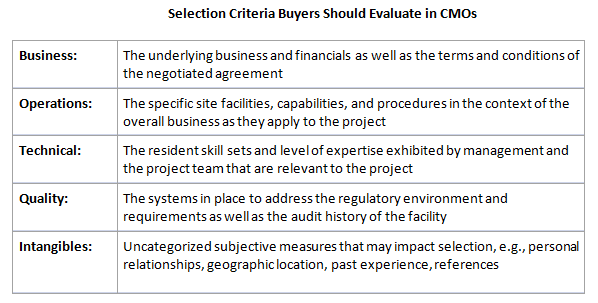CMO Selection: Are You Qualified?
By Ray Sison
When I sold commoditized services such as tableting and encapsulation for CMOs, the strategy for landing new business was a combination of leveraging brand, competitive pricing, relationship building, and brute force cold-calling. It was uniquely challenging; success was measured by revenue generated and level of activity. I had to find and win new business.
was a combination of leveraging brand, competitive pricing, relationship building, and brute force cold-calling. It was uniquely challenging; success was measured by revenue generated and level of activity. I had to find and win new business.
As a consultant, clients do not need brokers to find commoditized services. Instead, procurement experts are often assigned difficult-to-place projects requiring specialized services, innovative technologies, or scarce capacity. In these cases, CMOs willing to undertake the added effort to partner these projects are not immediately searchable outside professional and personal networks. You need to know the system and the key decision makers to move your project forward.
Further, at highly sought-after CMOs with specialized services or innovative technologies, project inquiries that flood in are triaged quickly so limited resources can focus on only the best projects. In these cases, even high-priority leads need to be scrutinized.
Turning The Tables: You Need To Sell Yourself To The CMO
For those that qualify, a shark tank scenario plays out internally at weekly sales meetings where any project needs a champion to be considered by management and the proposal writing staff. Most people appreciate that negotiating an executable pharmaceutical development or supply agreement proposal can take several revisions, several months, hundreds of hours of effort, multiple technical calls, and site visits.
Detailed CMO selection processes are common in the contract pharma space, but on the other side of the table a client selection process often occurs when demand outstrips capacity in areas such as:
- aseptic processing
- niche technologies, e.g. spray drying, hot melt extrusion
- platform delivery systems/complex manufacturing, e.g., drug/device combination products.
If you find yourself in this situation, your business development representative will have to fight zealously to ensure your project gets resources and attention to proceed. From the initial contact on, you will need to make a strong case for your company by giving her complete, relevant information so she can properly advocate for your project to the CMO.

Thinking about a new CMO? Get the step-by-step on how to procure a CMO that fits your strategy and specific needs. Attend Ray Sison's webinar:
Selecting a CMO/CDMO: 11 Best Practices For Sourcing The Right Partner
Client Selection Criteria — A Look In The Mirror
Categorizing criteria helps focus discussions and guide evaluations. Unsurprisingly, this is a two-way street. In similar ways and for reasons described above, CMOs also screen and qualify companies that approach them with inquiries, i.e., you too will be evaluated against predetermined criteria, such as those that follow.
- Business: A preliminary assessment of the profitability of the project and likelihood of success. Is a company adequately funded, and will they be reasonable in negotiations? Did they provide adequate information to develop a proposal? When will the product/project ultimately be profitable (time to revenue)?
- Operations: The complementary skill sets available to manage the project. Are they properly staffed with qualified personnel to manage the project? Will they be accountable for their responsibilities? Does the management and technical staff have a track record?
- Technical: The baseline information available to assess the project. Is a detailed RFP/technical package being submitted? Is there a technical fit with existing facilities/equipment, or will CAPEX be required? At what level do they understand the technical challenges inherent in their product?
- Quality: Will they provide adequate cross-functional guidance in regulatory/quality, etc.? What is the regulatory strategy for the product (i.e., how/when will this project become profitable)?
- Intangibles: Are they engaged and responsive to questions, comments, and other feedback? Are they innovating in new areas that align with the growth strategy of the CMO? What past personal experience can be leveraged or overcome?

Information The CMO Needs To Choose You
Successful sponsors will not hesitate to get in front of CMOs early in the process to sell themselves, their company, and their project.
In addition to this best practice, structuring the RFP to reflect the profile and personality of your company helps create a winning narrative. While the primary purpose of a well-thought-out RFP is to convey relevant information about a project’s objectives, deliverables, and timing, it also serves as a screening tool to qualify a sponsor and sell a project to the CMO where it may be competing against similar projects for the same resources, line time, or equipment.
You should use preliminary discussions with a CMO and the RFP/technical package to sell your company, demonstrate that you are well-organized and technically competent, and provide the right information for the project. Set the tone and narrative of the RFP with a brief intro including:
- nonconfidential business information that legitimizes your company
o investor information/source of funding
o company background/history
o leadership and their track record of success
o business model and value proposition
- link to website or list the ticker symbol for the company
- link to website or list the ticker symbol for VC, co-developer, or other relevant partner.
Briefly elaborating these points in an RFP executive summary before launching into the technical aspects should incentivize the CMO to prequalify the lead as the RFP circulates internally. During technical calls and meetings, focus introductions and company background to address screening questions and selection criteria to qualify and strengthen your position.
Proactive companies and professionals tasked with procuring CMO services for difficult-to-place projects must become advocates to overcome barriers with a strategized approach and compelling narrative.
About The Author:
 Ray Sison is VP pharmaceutical outsourcing and tech transfer at xCell Strategic Consulting. He began consulting in 2011 after recognizing a need for expertise in pharmaceutical outsourcing among the discovery- and clinical-stage pharma companies he served while selling services at Patheon and MDS. Based on his experience, Sison provides insight to the CMO’s business and operations, helping his clients negotiate and achieve better outcomes. Additionally, he has developed sound processes and templates to streamline CMO procurement to save time and cost. In this series of articles, as well as online webinars, he continues to share best practices and case studies helping improve the outsourced business model. You can reach him at rsison@xcellstrategicconsulting.com or connect with him on LinkedIn.
Ray Sison is VP pharmaceutical outsourcing and tech transfer at xCell Strategic Consulting. He began consulting in 2011 after recognizing a need for expertise in pharmaceutical outsourcing among the discovery- and clinical-stage pharma companies he served while selling services at Patheon and MDS. Based on his experience, Sison provides insight to the CMO’s business and operations, helping his clients negotiate and achieve better outcomes. Additionally, he has developed sound processes and templates to streamline CMO procurement to save time and cost. In this series of articles, as well as online webinars, he continues to share best practices and case studies helping improve the outsourced business model. You can reach him at rsison@xcellstrategicconsulting.com or connect with him on LinkedIn.
